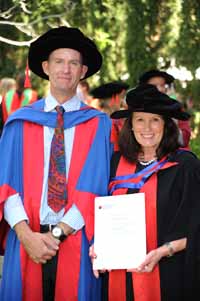Research at Charles Sturt University (CSU) has found that the use of simulations in police training in NSW better prepares both new and experienced officers for the 'real world'.
 Dr Amanda Davies, an academic in the School of Policing Studies at Charles Sturt University (CSU) in Goulburn, explored what characteristics are needed in a simulation exercise to transfer learning from the classroom to operational policing.
Dr Amanda Davies, an academic in the School of Policing Studies at Charles Sturt University (CSU) in Goulburn, explored what characteristics are needed in a simulation exercise to transfer learning from the classroom to operational policing."The training of police officers to make the right decisions in high risk and high stake situations increasingly relies on simulations," Dr Davies said.
"This is due to technological advances, and safety and financial issues surrounding the real world practice of the decisions officers have to make in the use of force and public order management."
Dr Davies based research for her PhD around two simulation exercises used in NSW Police Force training which aid in developing decision-making skills in high risk situations.
They included VirTra, a use-of-force simulation exercise for student police officers, and the Hydra/Minerva environment, a simulation exercise for senior officers involved in managing public order.
Dr Davies gathered data before and after the exercises by questionnaires and field interviews.
"The results show that these two exercises influence the development of new and experienced police officers' decision-making skills and their professional identity within law enforcement," she said.
"I found that both the new and experienced police officers did not require the full suite of tactile elements, specifically, touch and smell, to experience a sense of presence and immersion in the simulation exercise.
"The VirTra simulation uses surround screens. While there is typical environmental sound, landscape and dialogue of typical interactions between police and members of the public, there are no typical environmental smell elements replicated and the officer cannot 'touch' the characters depicted on the screens.
"Interestingly the study identified that, for experienced officers who have real-world policing experience, the actual task within the simulation is the most important element and the characteristics contributing to visual representation of reality are less important. For example they do not need to see any video of officers responding and attending a police incident to understand how the officers would carry out such action and what common characteristics would be present at the scene. These experienced officers are able to visualise these environments based on their operational policing experience.
"However the reverse is true for the inexperienced students, who have limited real-world policing experience.
"These learners require simulation characteristics which at a minimum engage sight and hearing in replicating the real word as closely as possible.
"The findings from the research have implications for the NSW Police Force in the future design and development of simulation based training exercises for police recruit training and operational police training initiatives.
During a graduation ceremony at CSU in December 2013, Dr Davies was awarded her PhD, The Impact of Simulation-based Learning Exercises on the Development of Decision-Making Skills and Professional Identity in Operational Policing.





Social
Explore the world of social